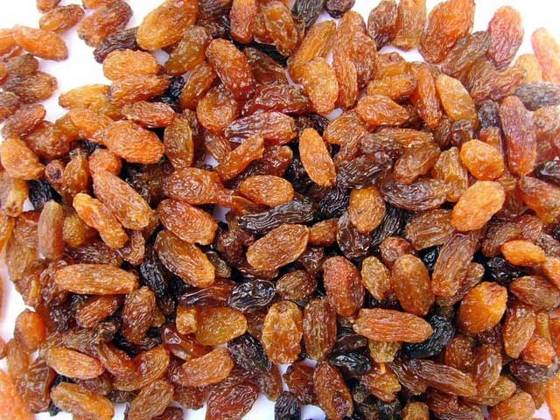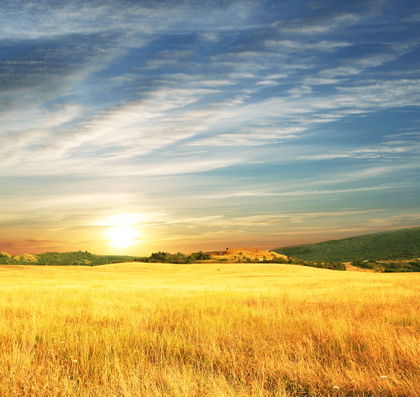Food Production and Farming in Turkey
Christina Martin (Group 4 Turkey)
Figure 1: Wheat field in Turkey's agriculture region (Intensive Farming)
Food and food production are the most basic needs of everyone on Earth. There are few different ways to farm and produce food. Extensive farming, as defined by The BBC, is “where a relatively small amount of produce is generated from a large area of farmland.” Extensive farming is more likely to use traditional farming methods and go organic with little to no pesticides used. Intensive farming, as defined by The BBC, is “where a large amount of produce is generated from a relatively small area of land.” Intensive farming will need more help, such as multiple workers and more use of machinery and technology, and it will also need more money to make it successful to produce food in bulk quantities. Intensive farming is also more likely to use pesticides and GMO’s (genetically modified organisms) to help mass produce more food. Intensive Farming uses small areas of land over and over again, damaging and using all the nutrients in the soil. This means intensive farmers have to use more nutrient rich land more frequently than Extensive farming, wasting soil and places for more food to be planted. Extensive farming is cheaper to maintain and does not need as many workers or as much work to produce select or low quantities of food
The industrial food production is much like intensive farming, it is to create and supply food in big bulks and quantities, like the mass production of food for large, popular fast food companies. These foods are more likely to be processed packaged ready-to-eat-meals. The traditional food production is much like extensive farming and focuses on the smaller quantities with fewer pesticides, GMOs, or other chemicals. Like with intensive farming, industrial food production will be more expensive to maintain and will need more money and workers to keeps it successfully mass-producing food.

Figure 2: Turkish Farmer
The economy in Turkey has had strong growth partly fueled by agriculture beginning in the, among other things, such as tourism, trade, manufacturing, and foreign investments. Turkey is considered to be one of the leading countries in the world when it comes to agriculture and food because of its climate and geological conditions. Turkey is one of the largest exporters of food/agricultural products in Eastern Europe, the Middle East, and North Africa. The agriculture industry accounts for 25-32 percent of the employment in the country. Most farming that happens in Turkey is intensive farming because there is a bigger demand for packaged, processed, ready-to-eat-meals, and frozen food. Turkey is the world’s leader when it comes to the production of dried apricots, sultanas raisins, hazelnuts, and dried figs. Turkey also has a large amount of dairy farmers that are produced to the citizens by both industrial and traditional food production.


Figure 3 & 4: Examples of two of Turkeys most exported items
There are problems arising with industrial food production and intensive farming because it leaves little land, money, natural resources, and other needed resources for traditional/organic farming. However, even with these problems there is a significant rise in organic and traditional farming. Many people in Turkey are beginning to question the methods used in intensive farming and industrial food production and are wanting to help more, be more informed on what is in the food they are eating, and to provide overall healthier foods for its citizens.
Figure 5: Turkish woman selling fresh produce at a farmers market in Kocaeli, Turkey.
Works Cited
Definitions of Intensive and Extensive farming
http://www.bbc.co.uk/schools/gcsebitesize/geography/rural_environments/farming_rural_areas_rev1.shtml December 1, 2014
Definitions of Traditional and Industrial Food Production
Exports From Turkey
http://www.bbc.com/news/world-europe-17992009 December 1, 2014
http://www.bbc.com/news/world-europe-17988453 December 1, 2014
Exports and Agriculture Employment in Turkey
http://www.invest.gov.tr/en-US/sectors/Pages/Agriculture.aspx December 1, 2014 http://www.allaboutturkey.com/agriculture.htm December 1, 2014
http://www.allaboutturkey.com/agriculture.htm December 1, 2014
Farming Methods In Turkey
Farming Methods In Turkey
http://www.todayszaman.com/business_organic-farming-in-turkey-still-limited-despite-improvements_246992.html December 1, 2014
Figures Work Cited
Figure 1
http://www.nationsencyclopedia.com/Asia-and-Oceania/Turkey-AGRICULTURE.html December 1, 2014
Figure 2
https://www.flickr.com/photos/wefwef/7513563396/ December 1, 2014
Figure 3
http://www.worldbulletin.net/news/139854/turkey-earns-169-billion-through-hazelnut-exports December 1, 2014
Figure 4
Figure 5
http://www.theperfectpantry.com/2012/02/market-to-pantry-27.html December 1, 2014

I never read this type of article before. I appreciate you for the article you have written. This is the best blog design and article. Very nice job. Thanks.
ReplyDeleteFarms Invest Turkey